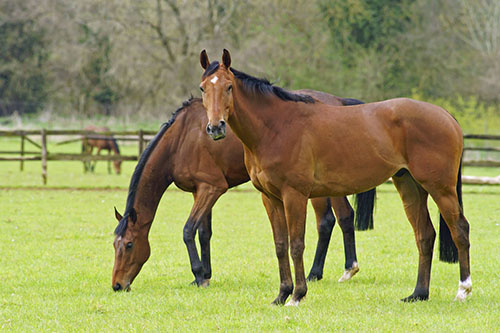Deworming strategies for horses
Sep 14, 2021

| By Kevin Cox, DVM with Alliance Animal Care LLC. |
In the “good ole days,” horses were dewormed on a rigid time schedule whether they needed it or not, and depending on personal belief, dewormer rotation may have been employed to avoid parasite resistance. Most horses were dewormed on this rigid time schedule regardless of the way the horses were managed or on their life category (foal, show horse, geriatric horse, etc). As it turns out, even though there were good intentions in preventing dewormer resistance, it seems that it is on the horizon anyway, and some parasite populations have already developed dewormer resistance.
One of the errors in past parasite management may have been the concept that horse populations could be totally parasite free. Is it even possible to deworm aggressively enough for a horse to have NO parasites? Is that even a desirable situation? The most renowned equine parasitologists are now teaching that horse owners should be concerned about keeping parasite burdens at a manageable level for the horse. Although it seems counter intuitive to the years of conditioned belief that a horse should be totally parasite free, it is now known that horses do not have to be completely parasite free to be healthy. Horses’ immune systems can handle a small parasite load. The goal of horse owners should be to develop a deworming schedule that keeps the horses healthy but avoids creating resistant parasites.
What are some ways to accomplish this goal? Key to this concept is the fact that 20% of the horses on a particular farm shed about 80% of the parasites. Identifying those horses that are the “frequent offenders” can be a huge help in designing deworming strategies for individual farms. How can those horses be identified? Fecal egg counts done by a veterinarian are the best way to determine horses that are more heavily parasitized than their counterparts. Additionally, some horses may be more susceptible to parasites due to circumstances of their life - age, job, management style, etc. The concept is to deworm the horses that need it aggressively while using less dewormer on horses that either have better natural resistance or have less risk. In the long run, this strategy will save the horse owner money and save the efficacy of the precious deworming drugs that are being threatened.
Horse owners, veterinarians, and suppliers of equine deworming products have the opportunity to work together to help improve deworming strategies for the horse. Ask your animal health supplier for more information on this type of deworming strategy and how you can work with your local veterinarian to increase the integrity of your equine deworming program.
For more content like this, check out the latest issue of the Cooperator.